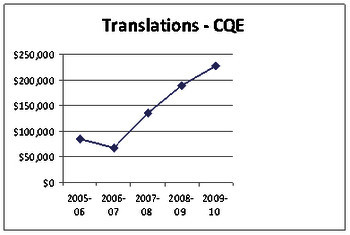Can you guess what all of the following have in common?
- Reading Profweb Expresso or La Vitrine Technologie’s newsletter to learn more about innovative ways to attain course objectives;
- Receiving the technical expertise to be able to apply new technologies through the services of APOP or La Vitrine;
- Taking Performa courses to become a better college teacher;
- Attending English language presentations at the annual colloque of AQPC to be better informed about Quebec’s College Network;
- Learning how to better conduct research and apply for funding grants with help from the Association pour la recherche au collégial and
- Accessing the interactive material and other resources on CCDMD’s Learning Centre web page.
Answer: All of these activities are made possible through funding by the Canada-Quebec Entente (CQE) on minority language education and second-language instruction, which is under the responsibility of the MELS. In the last four years these groups, as well as the Centre de documentation collégiale (CDC), Cégep@distance, DECClic, Infiressources and the IT Representatives’ Network have expanded what they do to include the needs of Quebec’s Anglophone colleges. Two other domains have also experienced a growth surge. First, as you can see from the graph below, translations have substantially increased since 2005, ranging from local college policies and journal articles to material aimed at helping students with disabilities.
Second, through collaboration with other colleges, innovative ideas to meet specific needs have doubled from last year. Below is a list of the college-based projects should your institution be interested in participating. Some of these have already been profiled in Profweb.

Increase of translations.
Second, through collaboration with other colleges, innovative ideas to meet specific needs have doubled from last year. Below is a list of the college-based projects should your institution be interested in participating. Some of these have already been profiled in Profweb.
| Project | Host College or Colleges |
|---|---|
| Project J@NUS Sharon Coyle’s and Sophie Jacmin’s team teaching using virtual and real time and place exchanges |
Vanier + Sept-Iles Cégep de la Gaspésie et des Iles (Fall 2009) |
| Pedagogy Basics for Teachers (PBT) Karina Leonard’s training of faculty to help teachers manage their courses through on-line self-paced tutorials |
Dawson |
| Educational Technology Basics for Teachers (ETBT) Rafael Scapin’s expertise in providing teachers with hands-on knowledge of the new technologies |
Dawson |
| Institutional Programs for the Pedagogical Induction of CEGEP Teachers (IPPICT) Normand Bourgeois’ training of pedagogical counselors within a given college to provide them with the tools to help integrate new faculty |
Champlain St. Lawrence |
| Integration of Students Entering the CEGEP Science Program after 2010 Don Hetherington’s and his colleagues’ development of a tool to assess math ability of incoming college students |
Vanier |
| MASCI – Math and Science Collaboration Initiative Karim Jaffer’s and his colleagues’ community building between high school, college and university to support the transition of QEP graduates through the Anglophone post-secondary levels |
John Abbott |
| Systems Framework Approach for Encouraging Enrolment in Technical programs Ken Fogel’s and his colleagues’ strategies for promoting enrolment in technical programs using Computer Science as a model |
Dawson |
If have any ideas for a collaborative project to enrich college students’ learning experiences and help them integrate into Quebec society, contact the CQE coordination team, which can help formalize your proposal. The deadline to apply for funding for the 2010-2011 academic year is February 15, 2010.
For more details on the Canada-Quebec Entente, view the web page from Dawson’s site at http://www.dawsoncollege.qc.ca/canque/index.php, and if you’re really adventurous, consult the official documents from Canadian Heritage. One thing is certain: through the enterprising minds of college personnel, the Canada-Québec Ententeis continuously evolving and taking on new dimensions.

